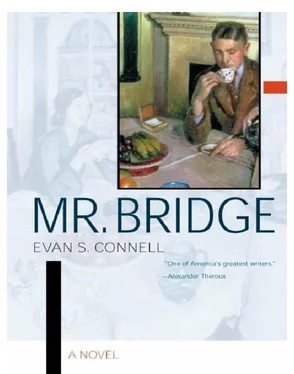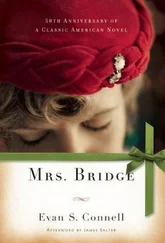From Monte Carlo they went to Genoa for a night, then to Pisa for a look at the tower, and from there they went direct to Florence which they liked immediately. It was hot and cloudy, but there was so much to see. The church of Santa Croce, the Ponte Vecchio, the Medici chapel, the doors of Ghiberti, the Piazza Michelangelo, and much more.
The second afternoon, exhausted by the size of the Uffizi Gallery and the humid weather, they decided to return to the hotel for a nap. As they were getting out of the taxi in the Piazza della Repubblica a toothless old woman came hobbling up mumbling something and holding out her hand. Mr. Bridge waved her away.
In the room he drew the shades and began to undress. The air was suffocating, and his feet felt like bricks from tramping the corridors of the museum. His wife had enjoyed the Uffizi, he was sure of that, so the afternoon was worthwhile. Even if she had not enjoyed it, at least they had been there. Tomorrow they could take in Michelangelo’s house and the Campanile, she wanted to do some shopping, they needed more film for the camera, and the Buca San Giovanni had been recommended for dinner. The following morning they would be off to Rome.
Mrs. Bridge, lying motionless on the bed with a damp washcloth over her face, said, “Walter, couldn’t you have given her a little something?”
For a moment he was puzzled, then he realized she meant the beggar, and he said: “Those people are all alike. You remember that child in Paris. They’ll take advantage of you every time, whenever they think they can, simply because we are American tourists. I’ve never known it to fail. They assume we are all millionaires, and I am sick and tired of it. These people can smell a dollar a mile away. That old woman doesn’t have much — I am not implying she is well off. But this is supposed to be a vacation and I don’t intend to have it spoiled. I’ve had enough requests for money since we left home. Everywhere I turn somebody has got his hand out. If you think I’m stingy, so be it. I plead guilty. But I want to have a good time on my vacation. Nor do I wish to be nagged about it.”
She lifted the washcloth from her face and said, “You’re right, I suppose. I simply couldn’t help feeling sorry for her. The poor old soul.”
“I feel every bit as sorry for her as you do,” he said, and he paused for a drink of water. Then he went on: “But it’s like pouring sand in a rathole. My Lord, I’m not able to feed everybody on this earth.”
No sooner had they walked out of one gallery or museum than she mentioned another. He concealed his boredom as much as possible. Occasionally he came upon a picture or a statue that he liked, but for the most part he accompanied her patiently and silently while thinking about what he must do as soon as they got back to Kansas City. London alone would have been sufficient, or the Louvre. Then there was Florence, and still she had not gotten tired of art exhibits. He could no longer count the number of museums and galleries, old and new, large and small, which they had visited. And now in Rome there were more. The Vatican treasures he did want to see. The Sistine Chapel, of course, and the famous Laocoön ought not to be missed. Of the hundreds of masterpieces they already had looked at he could remember only a few. The one he remembered most vividly, excepting the Mona Lisa and the Venus de Milo, was an Etruscan statue of a man and a woman reclining on a couch. They were smiling not at each other but into the distance, as if they might be entertaining company in their home. One of the husband’s hands rested affectionately on her shoulder and this casual gesture somehow proved that they were married. He was impressed that the artist had been able to present such a convincing embodiment of marriage and he had stayed to examine this piece of sculpture while she wandered along to something else. The figures were natural, almost commonplace, yet there was great distinction to them. They possessed a certainty which he understood, which he had not experienced in his own life until he married. The assurance of the reclining man pleased him because he had felt this strange, soft power himself, never more than when his wife was beside him; but he was more absorbed by the figure of the woman because of the confidence and trust she expressed. She did not doubt that she was loved, or that whatever she did while her husband was nearby was as it should be. He thought he had never observed such nobility shared by the men and women he knew.
She greatly enjoyed the cafes along the Via Veneto. There she was content to sit for an hour or more sipping lemonade or iced tea while chatting with English-speaking tourists; but he could not sit quietly for such a long time, and because she was safe in a respectable café they agreed that whenever he felt restless he would go walking and come back for her when it was time to return to the hotel. The plan worked nicely. Five days were allotted to Rome, and each afternoon at the conclusion of a sight-seeing tour they relaxed for a while at one of the cafes, then he got up and disappeared among the side streets. He walked rapidly, seldom pausing to investigate anything, because he was less apt to be accosted if he walked as though he was in a hurry to get someplace and he disliked these all-too-frequent encounters on the street. He strode past monuments, fountains, antique shops, galleries, and other attractions as if they did not exist, though he was aware of them, sometimes recognizing them from a previous sight-seeing trip. Walking invigorated him and helped him to think, and there was much to think about.
On his way back to the Via Veneto after one of these excursions he was hailed by a small, curly-haired boy with impudent black eyes and a shoeshine box. The hotel porter took care of his shoes, but the boy had such an engaging face that he stopped walking. The boy promptly crouched at his feet and went to work. Mr. Bridge was amused by his cheerfulness. He did not seem to feel deprived; apparently he did not mind polishing shoes.
“Giovanni,” he said, grinning, and tapped himself on the chest.
“You are Giovanni?”
He nodded vigorously and Mr. Bridge laughed.
“You marry?”
“Yes. Oh, yes indeed. I have been married many years.”
“You like?”
“Do I like marriage?” Mr. Bridge asked with a smile. “Why, yes, of course. And when you grow up, Giovanni, you too will get married.”
Giovanni laughed.
“You like banana?”
“Bananas? Why, yes, I like bananas. In fact, I like bananas very much.”
Giovanni hopped to his feet and beckoned, and all at once the conversation became intelligible. Mr. Bridge marched back to the Via Veneto with one shoe polished.
Dear Carolyn and Douglas:
Your mother is suffering from another of her sick headaches this afternoon, hence I am writing to you in her stead. I hope you will not mind this substitution. I am not much of a letter-writer. However I shall do the best I can. As you no doubt have observed from the postmark on the envelope we are at present in Rome. I believe Mother has kept you informed of our travels up to this point, so I shall not summarize.
The weather here is muggy and cloudy. Our itinerary calls for us to leave for Naples and Sorrento the day after tomorrow, and we are hoping to find some sort of breeze at these places. It would be a welcome relief. Otherwise our stay here thus far has been pleasant. We have walked through the ruins of the Colosseum, have been to the Borghese Gardens as well as the museum there, also to the baths of Diocletian and Caracalla, as well as numerous other sights. Rome is comparable in certain respects to Paris and London. The Via Veneto is a major boulevard and is your mother’s favorite spot. Recently we chanced to be seated at a café when an American couple inquired if they might share our table as no other tables were available. Naturally we said yes, and were very glad we did so, as they turned out to be Mr. and Mrs. Marvin Dunn of Kansas City! This is indeed a small world, as the saying goes. The Dunns are acquainted with the Montgomerys and the Koeppels, as well as several other couples we know. They were returning from a trip to the Holy Land and had much to say about it (having visited the Mount of Olives, Bethlehem, Nazareth, Sea of Galilee, etc.). They say the Jordan River is about the size of our Blue River at home. I was under the impression the Jordan was considerably larger. Your mother and I have discussed the feasibility of altering our itinerary to enable us to see the Holy Land, but have concluded there is insufficient time, as I must be at my office on the sixteenth.
Читать дальше












